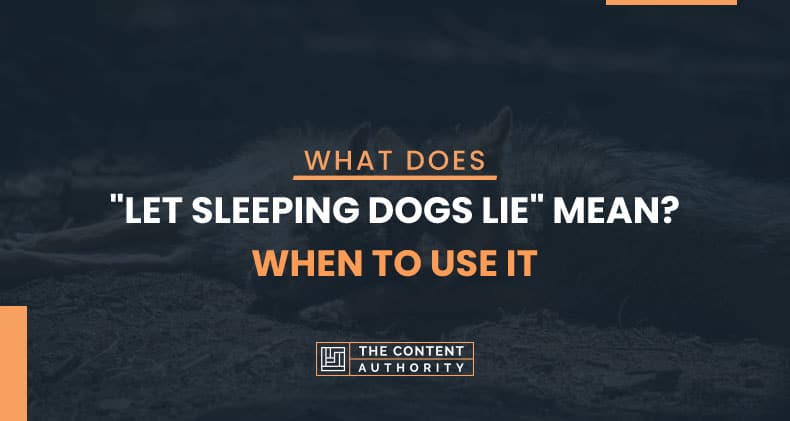Idioms are words or phrases that are present in every language. However, they are not intended to be interpreted literally. “Let sleeping dogs lie” is one of those idioms frequently used in the English language when writing and speaking. So let’s find out more about this term and how to use it appropriately.
If you hear the phrase, “let sleeping dogs lie,” it’s basically a warning not to interfere or disturb a situation since your interfering is most probably going to cause problems. Another interpretation is that it’s best not to bring up bad past incidents if people no longer remember them.
“Let Sleeping Dogs Lie” – Origins of the Phrase
The term ” let sleeping dogs lie” is obtained from the well-established scrutiny, which reveals dogs are somewhat unpredictable if they are disturbed all of a sudden. Probably the earliest individual to execute this thought into print was Geoffrey Chaucer. The belief as such, however, may be primordial as suggested by this statement :
“It is nought good a slepyng hound to wake.”
It’s highly likely that this expression arose as a means to warn people about the danger of waking up a possibly dangerous animal; however, it turned metaphorical at a later stage.
By then, it was settled as a catchphrase, or as it is known in the present time, it was more like, “if it ain’t broke, don’t fix it.”
It is believed that Sir Robert Walpole, known in the 18th century as a British politician, used this term frequently. Therefore, the phrase was even credited to Robert, and the term is mentioned quite a bit in his print and became his motto.
Since it was quite closely connected with him, it also became the etymology of a cartoon, made later.
No explanation was ever provided for the basis of this categorization and is not founded on any proof.
Furthermore, the expression cannot be found anywhere in Robert’s published work; according to the information we are privy to, he possibly never uttered this term. So while it was known that he had a habit of dishing out discretion in diplomatic affairs, he did not use nor coin the phrase, “let sleeping dogs lie,” if the proof has anything to say about it.
“Let Sleeping Dogs Lie” – Meaning
This frequently used term basically means that you should not stir up unnecessary trouble. Alternatively, it means if a problem is avoidable, then, by all means, avoid it and try not to do anything that would lead to unnecessary trouble or problems for you.
This concept came about from the idea that waking up a sleeping dog could be potentially dangerous if done suddenly. The term is more likely meant for guard dogs who have a tendency to attack once they’ve been woken up suddenly.
Over the decades, the term has become associated with a number of situations in which you might want to interfere with at the price of bringing trouble or calamity upon yourself or oneself when you can simply leave the situation alone and have peace.

When and How to Use “Let Sleeping Dogs Lie”
This phrase is intended to remind people that some situations are better left alone. In other words, your actions can lead to reactions that you may not like or could be burdensome to you.
For instance, one individual may say this phrase to another to prevent them from questioning a rule, starting an argument, or provoking their parent or partner. In fact, it may be used to prevent people from acting out in any other way that could lead to trouble.
On the other hand, this term may be repeated to remind you that if you wake a sleeping dog, you should proceed with caution and do so gently, or else acting too swiftly or harshly will lead to your demise.
When: This term should be used in situations where you can evidently see that someone is about to get themselves in trouble by questioning or provoking a person or situation.
It is also especially fitting to use this term when you see that a friend or family member is trying to bring up a long-forgotten or forgiven past.
How: The best way to use this phrase is to do so civilly, gallantly, or courteously. You don’t want to get yourself into trouble by being too abrupt or seeming too exemplary because that would defeat the very purpose you are trying to achieve. So try to give caution cautiously, or if you are told that your advice is not welcome, then perhaps the sleeping dogs must be awoken.
Other Ways to Say “Let Sleeping Dogs Lie”
There are many terms and catchphrases that you can use instead of “let sleeping dogs lie.” Here are some of them:
- Let things be
- Business as usual
- Ignore a problem
- Leave things as they are
- Leave things the way they are
- Leave a situation alone
- Avoid interfering in a situation
- Avoid rekindling an old argument
- Don’t restart an old argument
- Don’t instigate trouble
- Ignore a problem
- Leave something alone
- Don’t poke that bear
- Leave it at that
- Leave the situation undisturbed
- Don’t mention a bad situation
- Let well enough alone
- Don’t stir up trouble
- Don’t make matters worse
- Don’t trouble trouble until trouble troubles you
- Disregard
- Take no notice of
- Shut one’s eyes to
- Pay no heed to
- Look the other way
- Let this go
- Don’t poke the dragon

The Opposite of “Let Sleeping Dogs Lie”
- Nose around
- Be nosy about
- Interfere
- Poke nose into
- Intrude in
- Meddle in
- Stand in the way of
- Influence
- Restrain
- Baulk
- Block
- Barge into
- Be a hindrance to
- Butt into
- Confuse
- Disturb
- Disrupt
- Frustrate
- Encroach on
- Entrench on
- Gatecrash
- Hamper
- Hold up
- Impinge on
- Impede
- Intervene in
- Muscle into
- Pry into
- Snoop into
- Cause trouble
- Mess with
The Use of “Let Sleeping Dogs Lie” in Writing
As is the case with all catchphrases, watchwords, and slogans, you may find this one in everyday speech with ease. This is why many writers integrate this phrase into their dialogue. The reader or audience is often more easily persuaded when an exchange between two characters in a story or book is more pragmatic.
The term may be used in a story by a narrator as well. In fact, when the narrator makes use of this phrase, then it anticipates that something is coming. It may imply that some negative situation is about to transpire or that one or more characters are about to get themselves into trouble.
That said, not all writers prefer to use these idioms or catchphrases in their writing. While some of them don’t mind making use of them, others choose to come up with original terms and phrases to make their writing all the more unique.
At the end of the day, these proverbs are just that because they are used all the more frequently, and this results in them becoming overused or cliches, or if you may, overused cliches.
Example Conversations with “Let Sleeping Dogs Lie”
A conversation between mother and daughter:
Mother: How are things at school?
Daughter: I’m having some issues with Jane, but I’m not sure if it’s worth confronting her.
Mother: If it is not a major issue, it’s best to let sleeping dogs lie.
Discussion between two co-workers:
Co-worker 1: I’ve got an issue with Mark.
Co-worker 2: Do you think it’s worth bringing it up at the risk of causing tension on the team?
Co-worker 1: No, it is actually a personal issue and not work-related.
Co-worker 2: Okay, well, it’s probably best that you let sleeping dogs lie.
Example Sentences with the Term “Let Sleeping Dogs Lie”
- As Algernon was light-hearted in the morning, Denise chose to put aside their misunderstanding last night. She figured it was best to let sleeping dogs lie.
- The two parties haven’t agreed on a way forward as yet; however, they’ve resolved to let sleeping dogs lie.
- Investigations into certain matters will definitely bring a lot of controversial issues to the surface, so the government in times gone by has agreed to let sleeping dogs lie.
- My boss didn’t ask me about coming late yesterday, so I didn’t explain myself either; I thought it best to let sleeping dogs lie.
- We already knew that we would come to no consensus on the matter, so we just decided to let sleeping dogs lie and not talk about it any longer.
- I really wanted to give her a piece of my mind, but then decided to instead let sleeping dogs lie.
Other English Idioms
Conclusion
The phrase “let sleeping dogs lie” has been used since the 1300s and is more relevant now in the present day than ever before. It is essential to understand exactly what this phrase means to accurately use and apply it in your writing and your conversations with people. However, once you get the hang of it, you will be using it more effectively and definitely more frequently.
Shawn Manaher is the founder and CEO of The Content Authority. He’s one part content manager, one part writing ninja organizer, and two parts leader of top content creators. You don’t even want to know what he calls pancakes.


